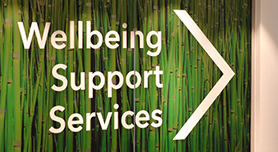Be Well, Learn Well
This section of the library contains the content that has been captured from interviewing students from the University of Warwick regarding their thoughts and opinions of wellbeing in the learning environment. During this interview phase, we used the same four themes from the Phase 1 report to guide the questions. This way, we were hoping the results would complement the findings we were receiving from staff interviews.
We decided to use the friendship interview, a method that has was inspired by The Radio 4 Listening Podcast; also, backed up by this study, which advocates the removal of a researcher and the use of peer interviews to gain a greater insight into student experience in higher education institutions. Following this idea, we invited students to take part in the interview if they could sign up as a pair, who knew each other well and preferably from the same course/year so they could discuss the same teaching and learning enviroment.
As a team, we found the student response incredibly insightful. We had to change our tactics in response to the COVID-19 lockdown, but we managed to replicate the student interview methodology. This was carried out by one of the Library Officers where during the interview, we would invite the student pair to discuss their experiences with a given topic such as; assessments, personal tutors, social cohesion, cultural and international integration etc. After this, we would then turn off our camera and microphone and while recording the conversation, we would let the pair discuss the topic for as long as necessary, only interjecting when they strayed off-topic.
We have formalised the results into two sections for the 'Learn well, Be well' section of the library.
The first is a list of 'Student Pedagogies', which is essentially a list of different tactics used by the interviewed students which help with their wellbeing in the learning environment. The second is a list of student quotes that we thought highlighted some key areas for improvement. This section is to be viewed by staff and students, as we feel it may help staff understand a student's perspective on what is important for their wellbeing. Also, students may find it useful to know that they're not alone in thinking or feeling certain ways about their learning environment.






